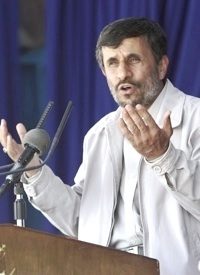
Voice of America News reported on May 26 that Iranian President Mahmoud Ahmadinejad, speaking during a televised news speech made in the southeastern city of Kerman, called on Russia and the United States to accept a nuclear fuel-swap deal, warning that it will be the last chance to resolve the nuclear stand off.
On May 21, Iran submitted a letter to the International Atomic Energy Agency (IAEA) outlining a plan to send 1,200 kilograms of low-enriched uranium to Turkey in exchange for higher-grade fuel for a medical research reactor in Tehran. ??VOA quoted U.S. Secretary of State Hillary Clinton’s statement to reporters in Beijing on May 25 that there are a "number of deficiencies" in the plan that do not address concerns raised by the “international community.” Clinton called the deal a "transparent ploy" for Iran to avoid Security Council action.
Also quoted was Britain’s Prime Minister David Cameron, who told Parliament on May 25 that he believes it is time to increase the pressure on Iran, stating that the UK government has "a clear objective to ensure stronger U.N. and EU sanctions against Iran." (In a statement that some may regard as retroactively rendering Cameron’s words as ironic, or even hypocritical, on May 26, Britain’s Foreign Secretary William Hague announced for the first time before the House of Commons that Britain has a stockpile of 225 nuclear warheads.)
During his speech, over Iranian TV Ahmadinejad said that it was "unacceptable" for Russia to support U.S.-proposed UN sanctions against Tehran, and that if Russia voted for the sanctions it would support those who have been demonstrating their animosity toward Iran during the past 30 years.
"The Tehran declaration [on a fuel swap] is the best opportunity. We took an important step and said something very important. There are no excuses left," Ahmadinejad was quote by AFP.
In response, Russian presidential aide Sergei Prikhodko urged "those who speak on behalf of the friendly Iranian people" not to try to save face by using "political demagogy."
"Russia invariably follows its own long-term state interests. Our position is Russian, that is, it reflects the interests of all people of Russia, so it can be neither pro-American nor pro-Iranian," Prikhodko was quoted by Russia’s RIA Novosti news agency.
In his speech, Ahmadinejad also presented an open question to U.S. President Obama, asking him to either choose friendship with Iran by supporting the nuclear swap deal that it had signed earlier this month with Turkey and Brazil, or to be prepared for a permanent end to dialogue. AFP reported several weeks ago that Brazil and Turkey, two temporary members of the 15-strong UN Security Council, have consistently defended Iran’s nuclear fuel program, which the West suspects is cover for a nuclear weapons drive.
“Mr. Obama must know that this proposal is a historic opportunity…. [Mr. Obama should] know that if this opportunity is lost, I doubt the Iranian nation will give a new chance to this gentleman in the future,” Ahmadinejad was quoted by the Indian newspaper, The Hindu.
Ahmadinejad said that Obama should be wary of those who want Tehran and Washington to become permanent adversaries. “There are people in the world who want to pit Mr. Obama against the Iranian nation and bring him to the point of no return, where the path to his friendship with Iran will be blocked forever.”
The issue in dispute is whether Iran’s uranium enrichments program is intended for peace purposes, as Iran claims, or — as the United States and other Western nations suspect — is intended to produce a stockpile of nuclear fuel that may eventually be used to produce atomic weapons.
Iran has reportedly begun the process of enriching uranium fuel to a 20-percent level of U-235 required for a reactor in Tehran that is used to make medical isotopes. Weapons-grade uranium is enriched to about 90 percent U-235.
While international diplomats argue over the extent of Iran’s program and its intention for using the products of that program, few have broached the subject of national sovereignty and the supposed right of the “international community” (usually a euphemism for the UN) to compromise that sovereignty. The answer usually entails categorizing the nation in question into one of two categories, either “peace-loving” or “rogue.” Iran and North Korea are currently placed in the latter category.
For years, however, the Soviet Union, Russia’s predecessor, was allowed (and even helped, through information transferred by traitors within the U.S. government) to build a nuclear arsenal to match that of the United States. Today, though former agents of the old regime still maintain considerable power in Russia, that nation has been moved from the “belligerent” to “respectable” category, and even given a place at the table to hep decide whether the “rogue” states should be allowed to develop nuclear arsenals of their own.
The ultimate objective, if history serves to demonstrate anything, is to eliminate the distinction between “respectable” and “rogue” states entirely, and place the nuclear arsenal of all nations under the control of the “international community," that is, the United Nations. Ample evidence can be presented to reveal that whenever regulation of any nation’s nuclear arsenal is discussed, the ultimate objective is to regulate the arsenals of all nations.
We noted in our article, "The UN Nuclear Disarmament Conference,” (which contains more background documentation than we have room to repeat here): “It is curious that the solution proposed for possible development of nuclear weapons by a few rogue states such as Iran and North Korea is to place the nuclear arsenals of all the world’s nations (including the United States) under UN control.”
Photo: Iranian President Mahmoud Ahmadinejad, speaking in the southeastern city of Kerman: AP Images



